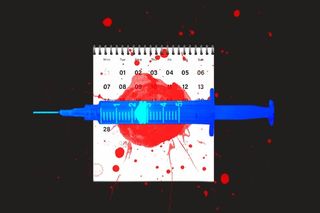
First Large‑Scale Study Investigates How Covid19 Vaccines Impact Periods
“This survey reveals how public health regards menstruation… perhaps it’s time for the protocol to change.”

Medicine does not take women’s bodies seriously. And since periods are still considered a “women’s problem,” even though we should know better, the link between Covid19 vaccines and menstrual cycles has remained largely unexplored.
People have been reporting “wonky” periods on social media since the beginning of the pandemic; last year, menstrual health experts, too, began calling for more focus and funding towards research into the impact of Covid19 vaccines on periods. Finally, published in Science Advances last week, a new study — based on a survey of more than 39,000 people who are either currently menstruating or did so in the past — delved into the subject.
Validating the experiences of thousands — if not, millions — of women across the globe, the present study found that as many as 42% of the participants experienced changes in their menstrual cycles since getting vaccinated. The range of changes exists on a spectrum, though — some people simply had the regularity of their periods interrupted, some dealt with greater pain, heavier flow, and longer periods, while some even experienced bleeding for the first time months after they had stopped menstruating.
Turns out, people living with conditions affecting menstrual cycles — like endometriosis, uterine fibroids, or polycystic ovary syndrome (PCOS) — experienced heavier periods. Many participants on contraceptives that pause periods bled after being jabbed. 39% of the participants on testosterone for gender-affirming therapy, too, bled unexpectedly. In fact, 66% of the post-menopausal participants also suddenly experienced bleeding — causing them unnecessary concern since post-menopausal bleeding could otherwise be a sign of endometrial cancer.
Related on The Swaddle:
Period Irregularities and Stress Levels Have Risen Together Since 2020: Study
The panic is one of the main reasons why it’s important to understand how vaccines impact people’s reproductive health. Making people aware of the side effects, informing them that these aren’t health risks, and are certainly not indicative of threats to their lives, helps combat anecdotal misinformation too — with the latter already having propelled us into an infodemic that health organizations, governments, and the media are attempting to tackle.
“Not knowing this was going to happen, not knowing the mechanism by which it happens, and not being prepared for it to happen meant it was an unnecessarily scary experience for many people,” Katharine Lee, a biological anthropologist, who led the study, said. “It is incredibly important to make sure people are prepared and not surprised. If you went and got a vaccine and they didn’t tell you you’d have a fever the next day, it would be really concerning because you weren’t expecting it… By knowing that changes to menstrual bleeding can happen, at least people are not surprised. They’re not shocked. They’re not worried that something major is wrong.”
The first Covid19 vaccine was administered to a woman in the U.K. in December 2020. And it’s only in the second half of 2022 that we have the first large-scale study on how it impacts menstruating individuals. A previous study on this subject had documented responses from just one-tenth of the number of participants involved in the present research — 3,900; 2,400 of them were vaccinated, and 1,500 were unvaccinated. Evidently, given that most menstruating individuals are women, and women’s health has remained underresearched throughout history, the delay in deeming the link between Covid19 vaccines and menstrual cycles to be worth investigating, is unsurprising.
It is only recently that scientists have begun to theorize how vaccines can “trigger downstream effects in the endometrium” — or the lining of the uterus, which is an immune-responsive tissue — by activating the body’s immune system. They believe this is what manifests as “wonky” periods.
Related on The Swaddle:
Lockdown Stress Is Disrupting Menstrual Cycles
The downside of the scarcity of research on the subject goes beyond endangering women’s health or inducing panic in large swathes of the global population; it wrecks people’s trust in vaccines. And the greater people’s vaccine hesitancy, the more society — at large — suffers. “[The lack of research] ended up making a lot of patients very mad… It weakens trust in medicine. It weakens your relationship with patients, and it feeds into this mistrusting of medicine, of the government, of pharma companies, all of which are really necessary for a functioning society,” Lee explained.
Lee isn’t alone in worrying thus. Kathryn Clancy, another biological anthropologist and co-author of the study, told Today, “There is a huge literature that shows that medical mistrust is one of the driving forces that makes people hesitant to get vaccines… Making sure that people are not surprised or distressed and they know what to expect is going to bring them a lot of comfort.”
Not only that, but having a better idea of how vaccines can impact periods, also enables people to plan their lives better. Further, if they knew what to expect, based on their work schedules, they could decide when to get jabbed, and how to prepare for any changes that could affect their day-to-day lives. Besides stocking up on Dolo for the post-vaccine fever, maybe, they’d have wanted to stock up on Meftal, too, for potentially worse menstrual cramps, too, rather than having to rush to the medical store while clutching their lower abdomens.
“This survey reveals how public health regards menstruation… it questions clinical trial protocol [noting] that follow-up for vaccines usually lasts seven days without an additional check on menstrual cycles,” stated an article on Inverse. “[P]erhaps it’s time for the protocol to change.”
Devrupa Rakshit is an Associate Editor at The Swaddle. She is a lawyer by education, a poet by accident, a painter by shaukh, and autistic by birth. You can find her on Instagram @devruparakshit.
Related


Rising Living Expenses Leads to Indians Working Longer, Says Report
